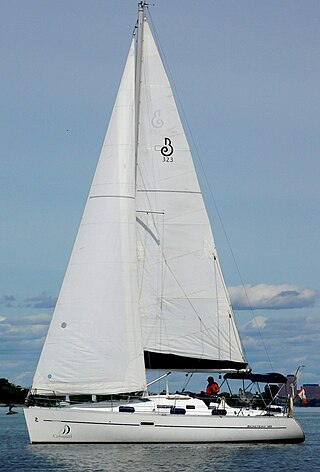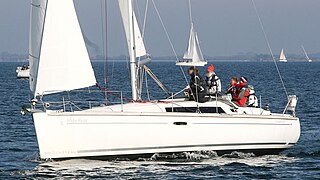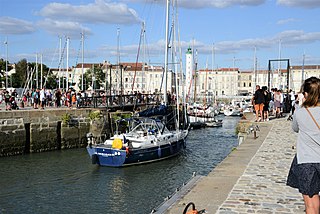Related Research Articles

The Beneteau Oceanis 321 is a French sailboat, that was designed by Group Finot and first built in 1995.

The Beneteau 323 is a French sailboat that was designed by Jean Marie Finot and Pascal Conq of Group Finot/Conq and first built in 2001.

The Beneteau 331 is a French sailboat that was designed by Group Finot/Conq for cruising and first built in 1999.

The Beneteau Oceanis 35.1 is a French sailboat that was designed by Group Finot/Conq, with an interior by Nauta Design, as a cruiser and first built in 2017.
The Beneteau 311, also called the Oceanis 311 and Oceanis 311 Clipper, is a French sailboat that was designed by Groupe Finot as a cruiser and first built in 1997 as a 1998 model year. The design was also sold as the Stardust 311 for the yacht charter market. The same hull design also served as the basis for the Figaro Solo, the Beneteau First 310, Beneteau First 31.7 and the Beneteau Oceanis 300.
The Beneteau 34 is a French-designed sailboat, that was manufactured in the United States. It was designed by Finot/Conq as a cruiser and first built in 2008. The interior was designed by Nauta Design.
The Beneteau 343, also called the Beneteau Oceanis 343 is a French sailboat that was designed by Berret-Racoupeau as a cruiser-racer and first built in 2004 as a 2005 model year.

The Beneteau 37, also called the Oceanis 37 and the Moorings 37.2 for the yacht charter market, is a French sailboat that was designed by Finot/Conq as a cruiser-racer and first built in 2006.
The Beneteau 393, also called the Beneteau Oceanis 393 and for the yacht charter role, the Moorings 403, is a French sailboat that was designed by Berret-Racoupeau as a cruiser and first built in 2002.

The Beneteau 40 is a French sailboat that was designed by Berret-Racoupeau as a cruiser-racer and first built in 2007. Versions were also sold as the Oceanis 40 cruiser and the Moorings 41.3 for the yacht charter market. The interior was designed by Nauta Design.

The Beneteau 42 CC, also sold as the Oceanis 42 CC, is a French sailboat that was designed by Groupe Finot as a cruiser and first built in 2003. The boat design proved popular in the yacht charter market.

The Beneteau 423, also called the Oceanis 423, is a French sailboat that was designed by Groupe Finot as a cruiser and first built in 2002. With a list of optional equipment as standard it is called the Oceanis Clipper 423.

The Beneteau 43, also called the Oceanis 43 and for the yacht charter market, the Moorings 43.4, is a French sailboat that was designed by Berret-Racoupeau as a cruiser and first built in 2006. The interior was designed by Nauta Design.
The Beneteau 44 CC, also called the Oceanis 44 CC, is a French sailboat that was designed by Bruce Farr as a cruiser and first built in 1994. The interior was designed by Armel Briand.
The Beneteau 46, also sold as the Oceanis 46, is a French sailboat that was designed by Berret-Racoupeau as a cruiser and first built in 2007. The interior was designed by Nauta Design.
The Beneteau 461, also called the Oceanis 461, is a French sailboat that was designed by Bruce Farr as a cruiser and first built in 1996. Armel Briand designed the interior. With optional equipment included as standard it was known as the Oceanis Clipper 461.

The Beneteau 473, also sold as the Oceanis 473, is a French sailboat that was designed by Groupe Finot as a cruiser and first built in 2000. It was widely used by yacht charter operators.
The Beneteau 49, also called the Oceanis 49, is a French sailboat that was designed by Berret-Racoupeau as a cruiser and first built in 2007. Nauta Design created the interior.
The First 18 is a French trailerable sailboat that was designed by Groupe Finot as a Micro Class racer-cruiser and day sailer and first built in 1978.
The Beneteau First 20 is a French trailerable sailboat that was designed by Finot/Conq as a cruiser-racer and first built in 2011.
References
- 1 2 3 4 5 6 7 McArthur, Bruce (2023). "Beneteau 523". sailboatdata.com. Archived from the original on 31 July 2023. Retrieved 31 July 2023.
- ↑ McArthur, Bruce (2023). "Oceanis 523 (Beneteau)". sailboatdata.com. Archived from the original on 31 July 2023. Retrieved 31 July 2023.
- ↑ McArthur, Bruce (2023). "Oceanis Clipper 523 (Beneteau)". sailboatdata.com. Archived from the original on 31 July 2023. Retrieved 31 July 2023.
- 1 2 3 4 5 6 7 Sea Time Tech, LLC (2023). "Beneteau 523". sailboat.guide. Archived from the original on 31 July 2023. Retrieved 31 July 2023.
- ↑ Sea Time Tech, LLC (2023). "Beneteau Oceanis 523". sailboat.guide. Archived from the original on 31 July 2023. Retrieved 31 July 2023.
- ↑ Sea Time Tech, LLC (2023). "Beneteau Oceanis Clipper 523". sailboat.guide. Archived from the original on 31 July 2023. Retrieved 31 July 2023.
- 1 2 3 4 5 6 7 Ulladulla. "Beneteau 523". Sailboat Lab. Archived from the original on 31 July 2023. Retrieved 31 July 2023.
- ↑ Ulladulla. "Oceanis 523 beneteau". Sailboat Lab. Archived from the original on 31 July 2023. Retrieved 31 July 2023.
- ↑ McArthur, Bruce (2023). "Jean Marie Finot (Groupe Finot)". sailboatdata.com. Archived from the original on 30 September 2020. Retrieved 31 July 2023.
- ↑ Sea Time Tech, LLC (2023). "Jean Marie Finot (Groupe Finot)". sailboat.guide. Archived from the original on 27 September 2022. Retrieved 31 July 2023.
- ↑ McArthur, Bruce (2023). "Beneteau". sailboatdata.com. Archived from the original on 30 September 2020. Retrieved 31 July 2023.
- ↑ Sea Time Tech, LLC (2023). "Beneteau". sailboat.guide. Archived from the original on 1 May 2023. Retrieved 31 July 2023.
- 1 2 3 McGeary, Jeremy (3 July 2006). "Beneteau 523". Cruising World. Archived from the original on 31 July 2023. Retrieved 31 July 2023.
- 1 2 3 Springer, Bill (23 August 2006). "Beneteau 523". Sail Magazine. Archived from the original on 29 May 2022. Retrieved 31 July 2023.